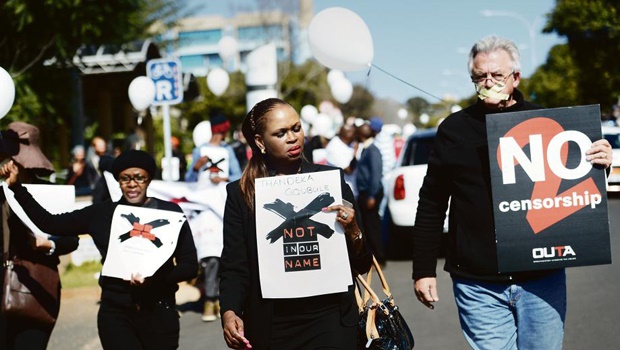
Even a dangerous megalomaniac cannot censor the news alone. Ferial Haffajee recalls her SABC days and speaks with insiders about how content is controlled
How is a regime of censorship constructed? Does it arrive quickly or does it take time? Who implements it?
As soon as the SABC was democratised in the early 90s, I lobbied a friend, who was part of the team deployed to change it from the Broederbond-run state broadcaster into a public broadcaster, for a job.
The five years I spent at the new SABC remain among the most rewarding ones of my career because the timbre of public media is different: you cover issues through a different lens.
Because proportionality and balance are intrinsic to public service journalism, you learn the important work of being fair and of covering the unreported corners of the country and continent. It is different to the commercialised mass media where I work now in that the imperative of content and coverage is service rather than profit oriented.
While at the SABC, I also learnt how very powerful it is as a political asset. The SABC is still, by a mile, the most influential source of information for the masses.
The governing ANC quickly constructed the set of laws and institutions to make the SABC a public broadcaster, but truth be told, it has always been a contested space that the party is not quite sure what to do with it.
This explains how it has appointed and deposed boards and chief executives like skittles in a game of tenpin bowling. The current board is barely quorate or functional and the major positions at the SABC are held by executives in acting positions.
But censorship is not a recent phenomenon at the SABC. While I was there as a current affairs producer, the pressure on me from the top was incessant, but the protective rules and systems made it manageable.
But this system of freedom began its journey of deconstruction under former CEO Dali Mpofu – now an Economic Freedom Fighters (EFF) luminary – who suppressed a report he commissioned into the blacklisting of independent commentators on the SABC’s broadcasting platforms.
That process of blacklisting, or censorship, was the work of then editor in chief Snuki Zikalala, an earlier version, though much smarter, than current acting chief operating officer and editor in chief Hlaudi Motsoeneng, who has crudely turned censorship from manageable and contestable to vicious and dangerous.
This turnaround happened quite recently, when the SABC’s editorial guidelines were amended to make Motsoeneng editor in chief.
Since then, edicts have followed to ban independent commentators, end certain call-in programmes, suspend staff, cut programmes and censor the coverage of active protests.
The solution to the problem is not to axe Motsoeneng, as this would not return our public broadcaster to us, the public. Ultimately, the solution will rely on citizen action and civil society contestation through the courts and regulators such as the Independent Communications Authority of SA; but also on a progressive ANC to decide whether it will be true to the constitutional provisions of free expression it helped give birth to.
I spoke to colleagues at the SABC to find out how censorship happens there. Here are some themes.
Megalomania
Several colleagues reported that Motsoeneng has adopted a position of megalomania. “I am the alpha and the omega,” he will say. When told that some staff planned to approach the board when his edicts got too wild, he said: “I am the board.” In this atmosphere, an imposition of a regime of censorship is easy. Dictators
do it all the time.
Who executes censorship?
It is hardly ever one person who constructs the system. At a broadcaster, you need the acquiescence of news managers, bulletin editors, scriptwriters and camerapersons.
Motsoeneng, like Zikalala before him, rules by fear.
His general managers – the mild-mannered Simon Tebele, radio boss Sebolelo Ditlhakanyane and TV news head Nyana Molete – do his bidding with some fear, according to colleagues.
Tebele, for example, is said to have ensured that no visuals of violence or damage to property during the recent Tshwane protests were aired.
In addition, according to staff, political editor Sophie Mokoena kept journalists from covering the running battles.
Tebele, Ditlhakanyane and Molete are not instinctively Stalinist personalities and they come from progressive news backgrounds, so I get the sense that they implement Motsoeneng’s megalomaniacal edicts because they have been there for too long and do not have options.
Colleagues have indicated that acting CEO Jimi Matthews also sliced and diced scripts to construct the censorship regime, which is aimed at boosting the ANC while freezing out rising opposition figures such as DA leader Mmusi Maimane and his EFF counterpart Julius Malema.
Bonuses and deployed cadres
Colleagues reported this week that Motsoeneng will often pay arbitrary (but welcome) bonuses to staff when rebellion rises.
In addition, he uses his power to hire and fire at will to put in place people who will toe his line.
One such person is Nothando Maseko, the acting head of TV current affairs, who has the dubious task of censoring and shaping news.
There’s always the board and the minister
Aggrieved politicians pick up the phone to board members. Former board chairperson Ellen Tshabalala reportedly took an aggressive stance in dealing with content.
The hobbled board is now led by Professor Mbulaheni Maguvhe, who appears to be enamoured of Motsoeneng, if this week’s press conference following Matthews’ resignation is anything to go by.
Reporters say Communications Minister Faith Muthambi and Motsoeneng are like two peas in a pod, so she will not exercise any countervailing authority over him.
TALK TO US
How should the public go about fixing the SABC?
SMS us on 35697 using the keyword SABC and tell us what you think. Please include your name and province. SMSes cost R1.50 each




 Publications
Publications
 Partners
Partners








